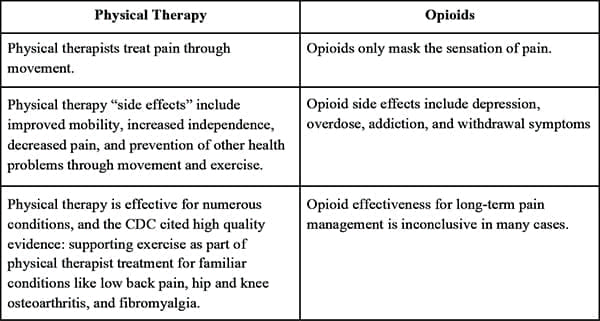Physical Therapy vs. Opioid Pain Killers
It’s no secret that there is a problem in the state of Tennessee with opioid drug abuse. Though the problem will vary from county to county, Tennessee hospital charges for opioid drug poisoning have risen 600% since 2001! It’s not only Tennessee that has the problem. Nationwide, the abuse of opiate medications has reached unprecedented levels. Since 1999, more than 165,000 people have died from opioid pain medication-related overdose. In 2014, more people died of overdose than any previous year. Shockingly, in 2012, healthcare providers wrote 259 million prescriptions for opiate pain medication. That’s enough for every American adult to have a bottle of pills. (source: APTA)
It is reported by the Centers for Disease Control and Prevention (CDC) that as many as 1 in 4 people who receive a prescription for opioids long-term for non-cancer pain will struggle with addiction. As you read this, you are probably able to think of someone you know who is struggling. So what is the answer? How can we avoid becoming addicted to pain medications? The answer is shockingly simple. Avoid taking them in the first place, if possible, and choose physical therapy (PT).
A chart, available for download from the American Physical Therapy Association (APTA) compares choosing physical therapy to choosing opioid pain medication for pain relief. (See below)
The arguments outlined here are fairly convincing. Physical therapy is effective for pain relief, without harmful side effects.
Highly Skilled in Numerous Interventions
Contrary to popular belief, PT isn’t only for post-operative recovery from surgery, recovery from a stroke, or rehab for other major debilitating events. While we are excellent at helping people recover from those things, we are also highly skilled at applying other interventions that have proven effective for pain relief, such as dry needling, joint mobilization, etc.
Movement Experts
We are movement experts and can often provide you with a personalized plan to help you with whatever is your source of pain. According to research done in 2012 and 2013, PT has even been found to be just as effective as surgery for knee osteoarthritis, meniscal tears, and rotator cuff tears in the shoulder. While surgery could be the answer, it can be often avoided by seeing a physical therapist first.
So, if you are suffering from chronic pain, why don’t you give physical therapy a shot? Treat the source of your pain instead of masking it with medication.

